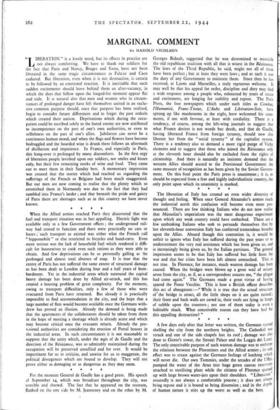The liberation of Italy has created an even wider diversity
of thought and feeling. When once General Alexander's armies reach the industrial north this confusion will become even more pro- nounced. There are few thinking Italians who do not now realise that Mussolini's imperialism was the most dangerous experiment upon which any weak country could have embarked. There are a few unthinking Italians who seek to persuade themselves that by her eleventh-hour conversion Italy has conferred tremendous benefits upon the Allies. Absurd though this contention is, it would be unfair to ignore what Italy has suffered during the past years or to underestimate the very real assistance which has been given us, and is increasingly being given us, by the Italian partisans. The general impression seems to be that Italy has suffered but little from the war and that her cities have been left almost untouched. This is not true. In Florence, for instance, much wanton damage has been caused. When the bridges were blown up a great wail of misery arose from the city, as if, so a correspondent assures me, " the plague had come again." The Germans made a great virtue of having spared the Ponte Vecchio. This is how a British officer describes this act of abnegation : —" While it is true that the actual structure or the bridge is intact, all the little shops on it are quite ruined ; their front and back walls are caved in, their roofs are lying in heaps of rubble upon the counters ; not one of them today is even a habitable shack. What conceivable reason can they have had for this appalling destruction? "
* * * *


























 Previous page
Previous page